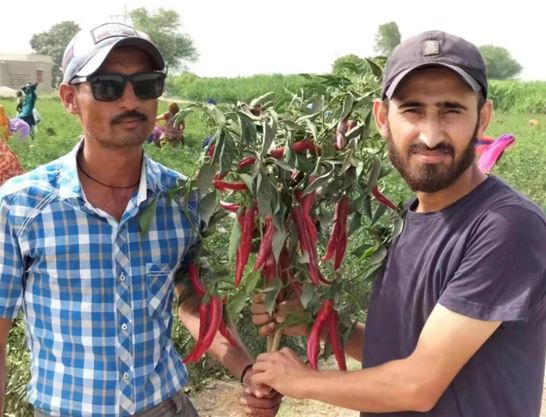By Song Haoxin, People’s Daily
“It’s my first time growing chilies. I was not expecting such a good harvest,” said Wahid, a farmer from Pakpattan, Pakistan, while Chinese expert Zhao Jianhua was instructing him to pick the plants.
Looking at the glowing red chilies, the Pakistani smiled with joy.
The seeds of the chilies planted by Wahid and its planting technology were from Chengdu, southwest China’s Sichuan province, which is thousands of kilometers away from where he lives.
The seeds were brought to Pakistan over three years ago by Chen Changwei, head of the Sichuan-based company Litong & Food, as well as technicians of the company.
After analyzing the climate, temperature and soil in the country, the company established an international agricultural development corporation together with another company in Sichuan, and started massive chili planting in multiple regions in Pakistan, including Hyderabad, Multan, Kasur, Okara and Lahore.
In 2021, the chili planting program startedin the village where Wahid lives, and it struck Wahid after he learned that chili planting is a highly profitable business. In November of that year, the man who originally planted corn tested water in chili planting.
The average income of chili planting is three times that of other crops, which stands at around 1,500 yuan ($215.31) per mu, or 667 square meters.
According to Wahid, farmers joining the program would receive seedlings as well as technical support and guidance on management, picking and drying. After the plants are dried by the farmers and pass quality inspection, they will be purchased by the Chinese agricultural company, he told People’s Daily.
Finding that the chili planting business has doubled the previous income, Wahid and several other farmers recently extended their contract for another three months.
During the 2022-2023 planting season, 15,000 acres of chilies were planted by Pakistani farmers in cooperation with the Chinese agricultural company, and the harvest is expected to reach 37,500 tons, said Chen.
According to him, the business will generate export value of $45 million and has created thousands of jobs for the local community. Besides, it has also nurtured more than 100 local experts of chili planting.
On the third meeting of the China-Pakistan Joint Working Group on Agriculture held in September 2022, the chili planting program was included on a list of agricultural projects under the framework of the China-Pakistan Economic Corridor.
Six demonstration farms that joined the program in Punjab and Sindh provinces reported bumper harvests in the past year. At present, chili seedlings are being planted and transplanted in South Punjab, and soon field management will kick off. The planting in Sindh is also advancing as scheduled. These chilies are expected to enter the Chinese market in June this year.
Gu Wenliang, Agricultural Commissioner of the Chinese Embassy in Pakistan, said both China and Pakistan are major agricultural countries, and Pakistan is home to vast fertile and arable land. Over 60 percent of the people in Pakistan are engaged in agriculture-related jobs.
“China has gained rich experience in seed cultivation and crop planting. The two countries see huge potential in agricultural cooperation,” Gu said.
Enhancing South-South agricultural cooperation is an important means to cope with hunger, malnutrition, poverty, inequality, and other global issues.
Over the past few years, China has actively launched South-South agricultural cooperation with other developing countries and practically implemented cooperation projects to help more countries and regions improve sustainable agricultural productivity and promote common progress of developing countries.


















